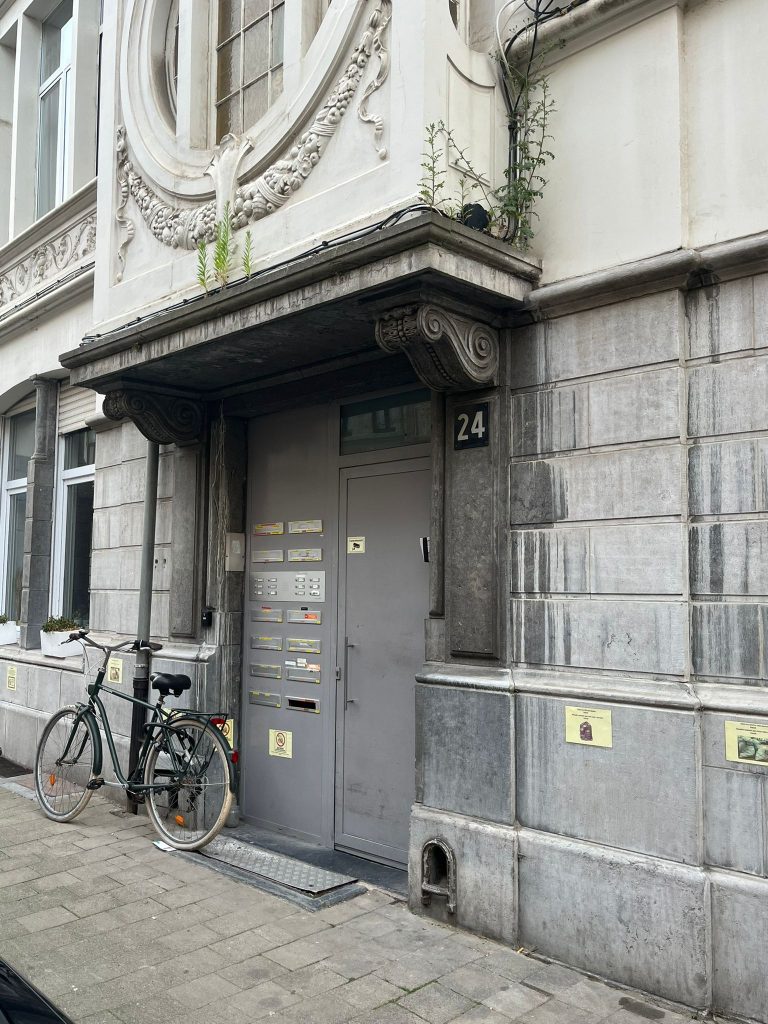At the heart of Le Case di Micòl, every house is a threshold between past and present. In Belgium, that threshold opens onto an address in Antwerp, on Lange Leemstraat, chosen to represent the Belgian Micòl: Jenta Gothelf. Her story is one of discretion and courage, of loss and renewal, deeply intertwined with the history of the city and its Jewish community.
Jenta Gothelf, a Young Jewish Woman in Flight
Jenta Gothelf was born in Berlin in 1922 to a well-off Jewish family of Polish origin. As Nazism advanced and persecution escalated, her family fled to Belgium, settling in Antwerp. There, on Lange Leemstraat, they tried to rebuild a life. But the Nazi occupation of Belgium in 1940 abruptly ended all hopes.

Jenta was arrested and deported to Auschwitz with other members of her family. She survived the camp and, at the end of the war, returned to Antwerp—to the very house she had left behind. There, quietly, she began again. For many years, she would not speak of her experience.
The Silence of Inherited Memory
After the war, Jenta remained silent about what she had endured. Like many women survivors, she chose silence—not to deny, but to protect: herself, her family, and the fragile fabric of a new life. It would be her granddaughter, decades later, who gathered her memories and transformed them into a story.
This gesture is at the core of Le Case di Micòl: the transition from individual to collective memory, from family history to shared responsibility. Through homes and human stories, the project seeks to reactivate remembrance and transform it into an educational tool.
Antwerp: City of Transit and Resistance
Antwerp was not only a temporary haven for many Jews fleeing persecution, but also a strategic hub in the Jewish resistance network. The city was home to one of the most important Jewish communities in Europe and witnessed numerous acts of solidarity, protection, and rescue.
Placing Jenta’s address on the project map means not only remembering her story but honoring the city’s collective memory and the moral courage of those who chose not to look away.
The Symbolic Power of Intimacy
When we speak of the Shoah, we often focus on the camps, the numbers, the transports. But every tragedy began in a private space: a home, a room, a garden. And likewise, every hope was reborn there.
Jenta’s house in Antwerp—the one she was torn from—is today a symbol. Not only of loss, but of resilience. Of someone who returned, rebuilt, and kept a door open. A gesture of hospitality that now echoes as a powerful message for the young people involved in the project.
A Connection to Contemporary Narratives
Though the films created within Le Case di Micòl are not directly inspired by Jenta, her story offers a cross-cutting symbol for the participants. Her act of welcoming, her quiet resistance, and her choice to protect others can inspire narrative threads and ethical perspectives in the students’ works.
The project Le Case di Micòl is funded by the CERV – Remembrance 2022 call and coordinated by Ferrara La Città del Cinema. Partners: Prague Film School, Warsaw Film School, ACT (Belgium), Blow-Up Film and TV Academy (Italy), Fondazione per il centro studi ‘Città di Orvieto’, Fondazione Giorgio Bassani, MEIS – National Museum of Italian Judaism and the Shoah, Istituto di Storia Contemporanea di Ferrara, and Istituto di Istruzione Superiore Luigi Einaudi.